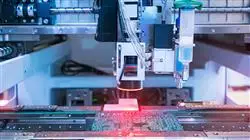University certificate
The world's largest faculty of engineering”
Introduction to the Program
Become an expert in Automation and Artificial Intelligence"

Automation and Artificial Intelligence are two of the most important technological advances that are generating more benefits for the industry and many other sectors, when they still have a long way to go, showing a promising future ahead. This field represents a great opportunity for those professionals who decide to specialize and who are in great demand in the labor market.
For this reason, TECH Global University has created a Postgraduate diploma in Automation and Artificial Intelligence with which to provide students with the skills and knowledge necessary to be able to face a professional future in this sector, with total guarantee of success.
And this, with an syllabus that addresses aspects such as the future of robotics and AI, Industrial Automation, Lean Manufacturing or Big Data, among others, in depth.
All this, through a 100% online mode that gives students total freedom to organize their studies and schedules as best suits them. All this, with the most complete teaching materials, information based on the most up-to-date sources and latest teaching technologies
Enhance your professional profile as an engineer and stand out in one of the sectors with the greatest potential"
This Postgraduate diploma in Automation and Artificial Intelligence contains the most complete and up-to-date educational program on the market. Its most notable features are:
- Development of practical cases presented by experts in Automation and Artificial Intelligence
- The graphic, schematic and practical contents of the book provide technical and practical information on those disciplines that are essential for professional practice.
- Practical exercises where the self-assessment process can be carried out to improve learning.
- Its special emphasis on innovative methodologies
- Theoretical lessons, questions to the expert, debate forums on controversial topics, and individual reflection assignments
- Content that is accessible from any fixed or portable device with an Internet connection
Completing this program will position you as an outstanding expert in Artificial Intelligence and Big Data"
The program's teaching staff includes professionals from the sector who contribute their work experience to this program, in addition to renowned specialists from leading societies and prestigious universities.
The multimedia content, developed with the latest educational technology, will provide the professional with situated and contextual learning, i.e., a simulated environment that will provide immersive education programmed to learn in real situations.
This program is designed around Problem-Based Learning, whereby the professional must try to solve the different professional practice situations that arise during the academic year For this purpose, the students will be assisted by an innovative interactive video system created by renowned and experienced experts.
Enjoy video summaries, in-depth videos or specialized readings from day one and without any limitations"

This program will equip you with the skills and competencies you need to achieve a successful position in the Engineering field"
Why study at TECH?
TECH is the world’s largest online university. With an impressive catalog of more than 14,000 university programs available in 11 languages, it is positioned as a leader in employability, with a 99% job placement rate. In addition, it relies on an enormous faculty of more than 6,000 professors of the highest international renown.

Study at the world's largest online university and guarantee your professional success. The future starts at TECH”
The world’s best online university according to FORBES
The prestigious Forbes magazine, specialized in business and finance, has highlighted TECH as “the world's best online university” This is what they have recently stated in an article in their digital edition in which they echo the success story of this institution, “thanks to the academic offer it provides, the selection of its teaching staff, and an innovative learning method aimed at educating the professionals of the future”
A revolutionary study method, a cutting-edge faculty and a practical focus: the key to TECH's success.
The most complete study plans on the university scene
TECH offers the most complete study plans on the university scene, with syllabuses that cover fundamental concepts and, at the same time, the main scientific advances in their specific scientific areas. In addition, these programs are continuously being updated to guarantee students the academic vanguard and the most in-demand professional skills. In this way, the university's qualifications provide its graduates with a significant advantage to propel their careers to success.
TECH offers the most comprehensive and intensive study plans on the current university scene.
A world-class teaching staff
TECH's teaching staff is made up of more than 6,000 professors with the highest international recognition. Professors, researchers and top executives of multinational companies, including Isaiah Covington, performance coach of the Boston Celtics; Magda Romanska, principal investigator at Harvard MetaLAB; Ignacio Wistumba, chairman of the department of translational molecular pathology at MD Anderson Cancer Center; and D.W. Pine, creative director of TIME magazine, among others.
Internationally renowned experts, specialized in different branches of Health, Technology, Communication and Business, form part of the TECH faculty.
A unique learning method
TECH is the first university to use Relearning in all its programs. It is the best online learning methodology, accredited with international teaching quality certifications, provided by prestigious educational agencies. In addition, this disruptive educational model is complemented with the “Case Method”, thereby setting up a unique online teaching strategy. Innovative teaching resources are also implemented, including detailed videos, infographics and interactive summaries.
TECH combines Relearning and the Case Method in all its university programs to guarantee excellent theoretical and practical learning, studying whenever and wherever you want.
The world's largest online university
TECH is the world’s largest online university. We are the largest educational institution, with the best and widest online educational catalog, one hundred percent online and covering the vast majority of areas of knowledge. We offer a large selection of our own degrees and accredited online undergraduate and postgraduate degrees. In total, more than 14,000 university degrees, in eleven different languages, make us the largest educational largest in the world.
TECH has the world's most extensive catalog of academic and official programs, available in more than 11 languages.
Google Premier Partner
The American technology giant has awarded TECH the Google Google Premier Partner badge. This award, which is only available to 3% of the world's companies, highlights the efficient, flexible and tailored experience that this university provides to students. The recognition as a Google Premier Partner not only accredits the maximum rigor, performance and investment in TECH's digital infrastructures, but also places this university as one of the world's leading technology companies.
Google has positioned TECH in the top 3% of the world's most important technology companies by awarding it its Google Premier Partner badge.
The official online university of the NBA
TECH is the official online university of the NBA. Thanks to our agreement with the biggest league in basketball, we offer our students exclusive university programs, as well as a wide variety of educational resources focused on the business of the league and other areas of the sports industry. Each program is made up of a uniquely designed syllabus and features exceptional guest hosts: professionals with a distinguished sports background who will offer their expertise on the most relevant topics.
TECH has been selected by the NBA, the world's top basketball league, as its official online university.
The top-rated university by its students
Students have positioned TECH as the world's top-rated university on the main review websites, with a highest rating of 4.9 out of 5, obtained from more than 1,000 reviews. These results consolidate TECH as the benchmark university institution at an international level, reflecting the excellence and positive impact of its educational model.” reflecting the excellence and positive impact of its educational model.”
TECH is the world’s top-rated university by its students.
Leaders in employability
TECH has managed to become the leading university in employability. 99% of its students obtain jobs in the academic field they have studied, within one year of completing any of the university's programs. A similar number achieve immediate career enhancement. All this thanks to a study methodology that bases its effectiveness on the acquisition of practical skills, which are absolutely necessary for professional development.
99% of TECH graduates find a job within a year of completing their studies.
Postgraduate Diploma in Automation and Artificial Intelligence
Delve into the fascinating world of automation and artificial intelligence through our Postgraduate Diploma program at TECH Global University. Discover the limitless opportunities offered by this ever-growing field, all from the comfort of your home with our online classes. In today's digital age, automation and artificial intelligence are transforming the way businesses and organizations operate. The ability to optimize processes, make intelligent decisions and create innovative solutions is essential for success in the business world. As an expert in automation and artificial intelligence, you will be prepared to lead the way to efficiency and excellence in any industry. Our Automation and Artificial Intelligence Postgraduate Diploma program will give you the theoretical and practical knowledge you need to excel in this growing field. You'll learn about the fundamentals of automation, including automated system design and robot programming. You'll also explore applications of artificial intelligence, such as machine learning, natural language processing and computer vision.
Upgrade your knowledge in Automation and Artificial Intelligence with TECH
By choosing our online classes, you'll enjoy a number of exceptional benefits. You'll have access to cutting-edge content, taught by experts in automation and artificial intelligence. Our hands-on approach will allow you to apply your knowledge through real projects and case studies. Plus, you'll be able to tailor your learning at your own pace, taking advantage of the flexibility offered by online education. TECH Global University is proud to offer high quality education programs, backed by our reputation as a leader in online education. Join us in the Postgraduate Diploma program and prepare yourself for a future filled with technological opportunities and advancements.







